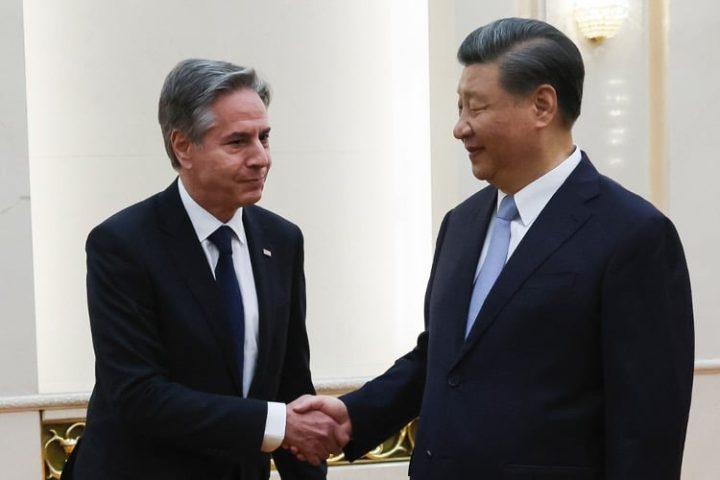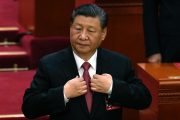
Over the weekend, U.S. Secretary of State Antony Blinken paid a much-anticipated visit to Beijing to meet with senior figures in China’s political scene, including Chinese authoritarian leader Xi Jinping, Chinese Foreign Minister Qin Gang, and high-level diplomat Wang Yi for what American mainstream media hailed as a “high-stakes visit meant to steer relations between the United States and China back on course after months of inflamed tensions between the two nations.” Blinken was the first U.S. top diplomat to visit China in five years, and the first official under the leftist administration of Joe Biden to do so.
Although both sides reaffirmed their pledges about not seeking the other’s weakening or overthrow, Alan Cafruny, a professor of international affairs at Hamilton College in New York, observed that few of the major issues in the Sino-U.S. rivalry had been sufficiently addressed. In an interview with Sputnik News, Cafruny said that those thorny Sino-U.S. issues “are almost certainly not susceptible to negotiations or compromise. However, improved communication may serve to de-escalate provocative and dangerous words and actions, perhaps most notably with respect to US rhetoric with respect to the ‘One China’ policy.”
The international relations specialist observed, “After having been postponed following the shooting down of an alleged Chinese surveillance balloon, Blinken’s visit to China, culminating in his meeting with Xi Jinping, represents an attempt by both parties to stabilize the relationship.”
“There was some limited progress with respect to air travel, student exchanges (more than 300,000 Chinese students are studying in the USA), and the willingness to improve communications. However, China will refuse to re-start military-to-military communication as long as Washington continues to sanction its defense minister. More generally, there is no evidence of progress with respect to Taiwan or the US broader containment strategy in which Europe and Japan are being enlisted. At the same time, anti-China sentiments are increasing on a bilateral basis in the context of 2024 elections,” Cafruny added.
China-U.S. relations are highly complex. U.S.-China trade is increasing and both countries are highly reliant on each other for economic stability. Cafruny’s observations were confirmed by statements made by Blinken himself, who, on June 19, mentioned China’s refusal to restart direct military talks with Washington following his recent meeting with Xi.
Although Blinken “raised repeatedly” the notion of establishing a crisis communication line between the American and Chinese militaries, “at this moment, China has not agreed to move forward with that,” Blinken admitted to reporters at a press conference after his two-day trip to Beijing:
“I think that’s an issue that we have to keep working on,” he said. “It is very important that we restore those channels. If we agree that we have a responsibility to manage this relationship responsibly, if we agree that it’s in our mutual interests to make sure that the competitive aspects of the relationship don’t veer into conflict, then surely we can agree and see the need for making sure that the channels of communication that we’ve both said are necessary to do that include military-to-military channels.”
Amid worsening bilateral ties since 2021, China’s leaders have refused or ignored several American requests, as well as about 10 working-level engagement invitations from Washington, according to Reuters, quoting an anonymous senior U.S. defense official.
In February this year, an American military jet shot down a Chinese surveillance balloon in American skies.
Furthermore, Chinese defense minister Li Shangfu declined an invitation for a formal meeting with American Defense Secretary Lloyd Austin at the Shangri-La Dialogue security forum earlier this month.
When questioned why Washington would want to maintain communications with China despite China’s seeming hesitancy for open military communications, Blinken asserted that such attempts were crucial for changes to happen.
“We’re not going to have success on every issue between us on any given day, but in a whole variety of areas — on the terms that we set for this trip, we have made progress and we are moving forward,” Blinken said, without providing more details. “But again, I want to emphasize none of this gets solved, resolved with one visit, one trip, one conversation. It’s a process. And my hope and expectation is that we’re more engaged in that.”
Nonetheless, retired U.S. Air Force Brigadier General Robert Spalding, presently a senior fellow at the Hudson Institute, is less optimistic about the prospects of Sino-U.S. ties.
The Chinese regime, Spalding claimed, is tapping on the military communication channel “as a bargaining chip to get more concessions from the Biden administration,” he posited in his interview with The Epoch Times sister outlet NTD.
“We’re the ones that are asking for it, and quite frankly, the only one that’s going to make any kind of military decision is Xi Jinping himself,” he said.
“Essentially, I think we’re going for something that the Chinese don’t really care about, and so therefore, they’re holding it out as a bargaining chip for something they do care about.”
Also, Spalding opined that he thinks the United States “just really lost the ball on what is important with the relationship.”
“China’s trying to strip-mine the US economy, and there’s no indication that we’re actually willing to protect it,” he said. Reducing America’s supply chain reliance on China, and rebuilding America’s infrastructure and industrial base, Spalding proposed, ought to rank higher in America’s list of priorities with regard to managing ties with China.
On a similar note, Cafruny said that there were “certainly no mysteries” about Washington being behind the nosedive in Sino-U.S. ties:
China’s integration into the US-led world economy starting in the 1990s was extremely beneficial to US (and European) capital. However, as China’s economic development began to threaten US primacy, Washington sought to contain China’s further rise, starting with Obama’s “pivot to Asia” and escalating under Trump and Biden with protectionist-albeit-self-defeating trade policies and then sanctions on China’s technology, most recently semiconductors. These policies have been accompanied by growing US and NATO operations in the Pacific. China refuses to subordinate itself to Washington.
Cafruny also mentioned how America has conducted provocative actions with respect to Taiwan, such as offering more military support as Biden dismisses the notion of the “One China” policy laid out in 1979. In turn, China has stepped up its military pugilism on the pretext of responding to perceived American dominance, such as increasing military drills around Taiwan, particularly following then-U.S. Speaker of the House Nancy Pelosi’s “ill-conceived visit to Taipei,” Cafruny said.
In contrast to the comments made by Spalding and Cafruny, top Biden administration officials painted a rosier picture of Blinken’s recent trip and the future of Sino-U.S. relations.
For instance, on June 19, White House Press Secretary Karine Jean-Pierre lauded Blinken’s visit as a “good step forward.”
“The meeting was constructive, which is important — important for Americans’ interest and important for the American people,” she said. “We believe it’s a good step forward for the Secretary to have a constructive conversation with President Xi.” It remains noteworthy that despite bilateral saber-rattling and antagonistic rhetoric, American capital continues to flow into China. Recent examples include visits by Jamie Dimon (JP Morgan) and Elon Musk (Tesla) to the communist nation that promoted greater economic integration between China and America. Bill Gates met with Xi Jinping in Beijing some days back as well, with Xi hailing Gates as his “old friend.”



